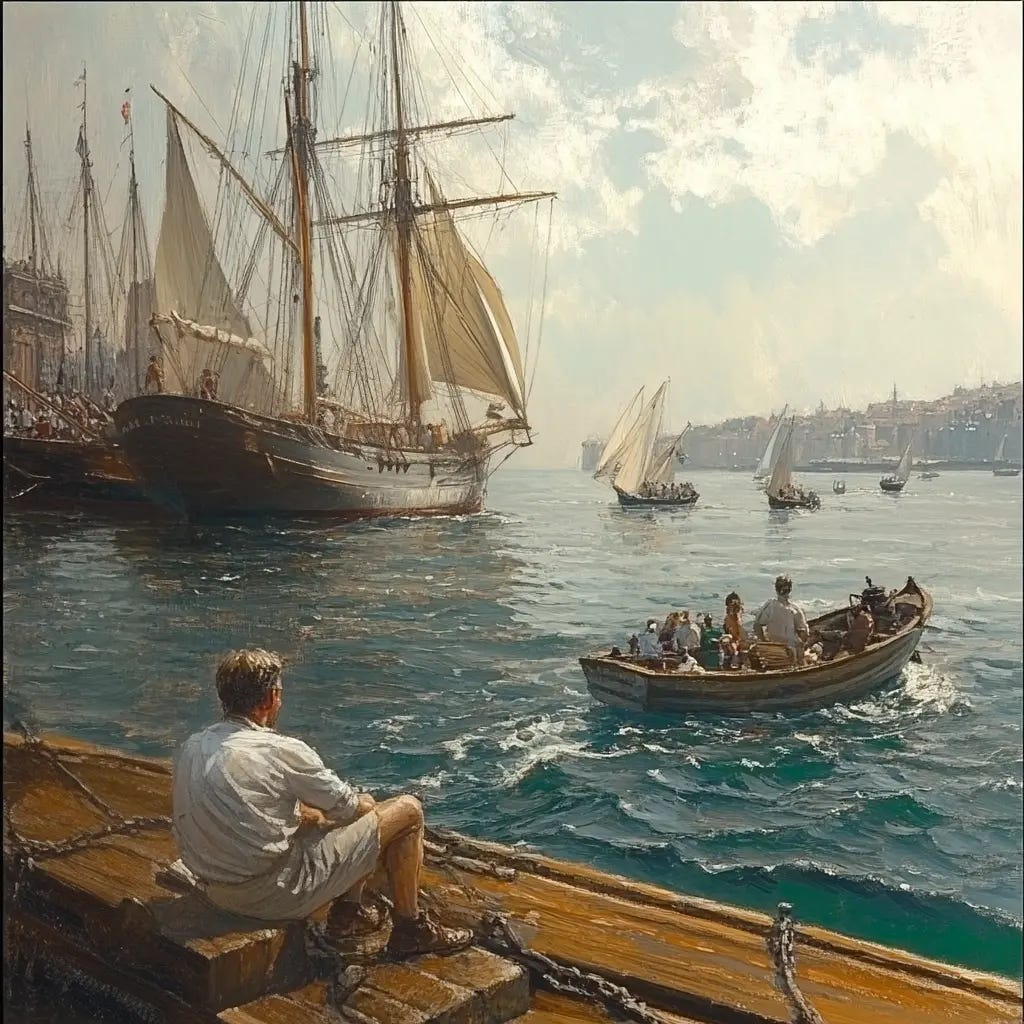Every Knock's a Gamble
Flash fiction, 700 words. For IAM's July 31 prompt.
Gareth sat on the deck of a sailboat and tried to relax. This was fine. These things happen. So the Titanic made it safely into New York Harbor. These things happened.
“Imonimisagatakagan!”
His sudden and unearthly screech drew startled looks from the passengers of a passing dinghy. He rubbed his ersatz hair and real but bloodshot eyes and tried to think. The hangover made it difficult.
This was fine. This could be undone. Should it be undone? Maybe it was fine. This could be undone.
He watched the great and the lowly disembark the colossal steamship down a long gangway to the solid stonework of the sunny wharf. Each foot that touched earth knocked also on the stronghold of destiny. He’d seen ignorant musings of primitive barbarians liken such things to a “ripple,” as though these things were so evenly cast.
Nothing could be so simple. A knock, a knock was it. Each of these surviving passengers knocked on a door. How long they waited, whether the door would open, who opened it, at what hour, these were all better metaphors than some half-baked pebble-in-a-pond analogy.
Should he undo it? Would that be worse? There were no laws about these things, only consequences. Maybe the world he knew, where the Titanic sank, was itself an alteration. One slip of the hand, one drunken poker game with a bunch of overdressed humans on the doomed evening of a doomed ship. Maybe a fellow Itharian had once doomed it. Maybe Gareth had reversed the doom.
Maybe it really didn’t matter. Whether a couple hundred pre-contact humans lived or died rarely opened or closed the doors of destiny.
Matter to what? To what?
“This is a good thing,” he decided. All in all, Itharians liked it when life survived. They weren’t conquerors or guardians, just drunken revelers in the jumbled slipstreams of their many mishandlings.
But rare was not impossible. And so it worried him when the Doncastian ship showed up. Nothing but a grey blip in the partly sunny sky, but his keen Itharian eyes weren’t deceived. One of these Titanic survivors had knocked a little too hard a little too late at night, and would soon be answered by an angry troll.
Should he interfere? The world had changed, like it did continually, moment by moment. That it was by his hand meant little.
Gareth had an idea. Reaching into a shirt pocket that no human thief would have found, he pressed a slider on a small device. Gareth the “Human” Sailor disappeared from view. He nudged a toggle and rose smoothly into the air until there was no air to breathe, but Itharians were an anerobic race.
The Doncastian ship loomed before him. They always loomed. He’d never seen a Doncastian recline peacefully. He attached a Thrip Pull to the hull and synchronized it to its counterpart on Mars, where he’d parked his own ride. The Thrip Pull was calibrated to his volume and mass. He didn’t like to think what it would do to a thousand-ton war skip.
He activated the Thrip Pull. Shlink. One second the ship was there, the next it was (he assumed) pulverized against his own ship in a red-rock cavern the next planet over. The passengers would likely survive. Their ship, his ship, not so much. Doncastians could survive on Mars. They’d live out their natural lives. No problem. None. He had to believe that.
He descended back onto the sailboat. He was Gareth the Human Sailor again. And he always would be, now that he had no way home. He couldn’t even go backwards, because the Time Pull had been on his ship. But he could still go forward, the natural way. He wasn’t stuck. This was fine.
The last of the passengers had disembarked to face the rest of their own natural lives.
“Knock, knock,” he said.
He couldn’t wait to see what would answer the door.


